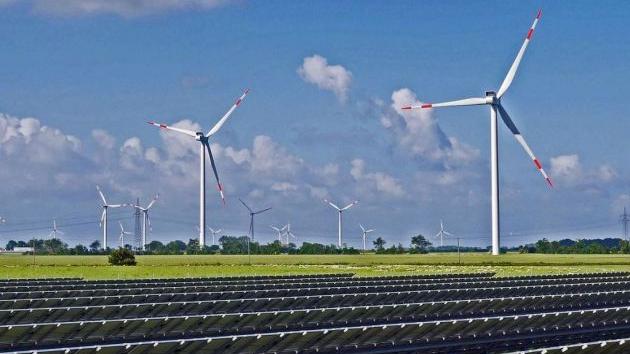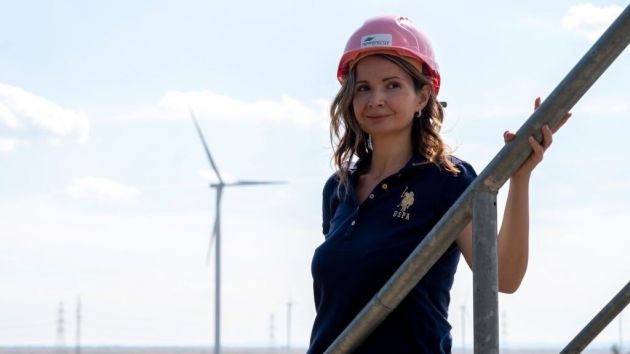RES SERBIA 2024: Conference reveals what second auctions in Serbia will look like, EPCG beginning to build first wind farm in October
Source: eKapija
 Thursday, 26.09.2024.
Thursday, 26.09.2024.
 12:02
12:02
 Thursday, 26.09.2024.
Thursday, 26.09.2024.
 12:02
12:02
(Photo: OIE Srbija/Goran Zlatković)

He also announced the introduction of a new criterion, by which, in addition to the offered price, the part of the capacities that the investor has intended for the supply of end-users is valued as well. That capacity can be offered to the guaranteed supplier, EPS, or some end-purchaser through a PPA (power purchase agreement), a corporate agreement on the purchase of electrical energy.
As Mrdak explains, with this criterion, the ministry wants to award the investors that are ready to help the end-purchasers.
– This will not be an elimination criterion, but an evaluation one, so if no investor secures an agreement with end-purchasers, the prices will be the main criterion. Even those who don’t secure an agreement with end-purchasers will be able to win at the auctions. But since an investor can bid 70% and leave 30% to the market, we want to see what it plans to do with that part – pointed out Mrdak.
We will, however, not learn who the winners of the auctions are before next year, because the plan is to give a slightly longer deadline period for investors to submit their bids and to publish the list after the New Year’s holidays. Mrdak notes that the ministry is carefully working on preparing the second round because it wants to maintain the success achieved with the first auctions.
– Last year, the prices were a bit higher because we wanted to attract participants. Now we had a different approach, we wanted to see what the cost of the construction of the projects was. We wanted to analyze the market, to see whether there were enough projects, because there was a fear that that the previous year’s auctions had “mopped up” the big projects, but I believe that we can fulfill the wind quota – says Mrdak.
The adviser to the minister notes that the prices will be significantly lower than in the previous auctions, but sufficient for attracting investors. He expects the auctions for solar energy this year to perhaps be even more attractive, and the outcome will show the future direction and whether the quotas need to be changed in the future.
– It would be natural for wind and solar to be equal, but we defined the first three-year plan in line with the real situation in the market, in which wind farms are more developed. Our decision will depend on the results of these auctions – pointed out Mrdak.
He reminded that the auctions were an instrument that enabled a mass development of RES projects with minimum costs for the citizens. As he says, in the region and beyond, the auctions will be the main instigator of the growth of renewable sources, because the market is not yet capable of ensuring a long-term elimination of the risk related to the changes of energy prices.
– The EU has recognized the auctions and the contracts for difference as the main incentives. I’m not saying that we shouldn’t be working on alternatives, but we have to do it patiently, although I understand the investors’ impatience – said Mrdak.
Montenegro: EPCG to start building first wind farm in October
The topic of auctions is also in focus in Montenegro. Ivan Bulatovic, the CEO of Elektroprivreda Crne Gore (EPCG), announced that the first auctions were expected in the first quarter of 2025 and that an analysis was being done at the moment as to what the best kind of incentives would be.
He pointed out that Montenegro was in a strong investment cycle and that, in the next four years, EUR 400 million would be invested in green energy. Still, he reminded that Montenegro still got 40% of its energy from coal.
– And that’s the problem we’re struggling with every day. The Energy Community is setting increasingly strict requirements in that sense and the question becomes whether fossil fuels will even be able to take part in the market race. We have invested EUR 80 million in the ecological reconstruction of our thermal power plant. We still see it operating, and to what extent its operations will be reduced, we will see – Bulatovic says and adds that Montenegro will lack plenty of renewable sources for the energy transition.
He announced that, in October, EPCG would start building its first self-owned wind farm, Gvozd. For the project of a wind farm of 54.6 MW, EPCG got a loan of EUR 82 million from the European Bank for Reconstruction and Development.
– We are developing several solar power plants, and then also the floating solar power plant with the EBRD. We are proud of the project Solari 5000+, where we expect photovoltaic systems with a total power of 70 MW to be installed on the buildings’ roofs. All this should ensure a steady transition toward green energy – notes Bulatovic.
When it comes to the interest of investors, he emphasizes that numerous investors are working on getting the building permits for RES projects.
– In the signed agreements on connecting to the transmission system, we have 1.5 GW, which is a huge number of potential megawatts considering the size of Montenegro. If all of it is realized as well, EPCG has to take a market position – points out the CEO.
When asked whether EPCG is interested in signing agreements on the buyout of electrical energy with investors, which to an extent solves the problem of the balancing of the system, which EPS is already implementing, Bulatovic points out that they are willing to make some kind of an arrangement with serious partners.
– However, nobody has appeared yet who plans to put a facility into operation. We can secure the balancing of the system through the market access fee – concludes Bulatovic.
EUR 144 million for Cibuk 2
Kai Rintala, the managing director of Taaleri Energia, which, together with Masdar, is behind one of the winners at the Serbian auctions, the Cibuk 2 wind farm, is satisfied with the outcome of the auctions. It is precisely at the special ceremony on the sidelines of the RES SERBIA 2024 conference that the agreement on the financial close of the Cibuk 2 wind farm was signed. The project financing of the wind farm of 154 MW is secured through commercial lenders, UniCredit and Erste (Erste Group and Erste Bank Serbia), which secure a loan of EUR 144 million.
– For us, the outcome of the auctions is fantastic. The auctions were organized with clear rules, an efficient process, and a good price has been achieved – pointed out Rintala.
Still, he emphasizes that one round of auctions cannot replace fossil fuels.
– A long-term solution for the development of RES projects has to be sought outside the auction system. It is important to have as many players in the market as possible. Auctions should be developed in parallel with the contracts for difference – he said and added that he believed that a market of commercial PPAs, agreements on the purchase of energy between the producer of electrical energy and a commercial buyer, such as companies or industrial users, would appear.
EBRD: Auctions are not be-all end-all
Francesco Corbo, the assistant director and regional head of energy of the EBRD, which is helping Serbia and Montenegro implement the auctions, mentions why it is important for investors that there is a multi-annual plan of the system of incentives.
– The cycle of three calls that exists in Serbia is important for investors so that they know they have a chance even when they don’t succeed in the first auctions. The auctions for Montenegro are being prepared at the moment, where there are also 2-3 rounds planned for the sake of consistency and security – announces Corbo.
Still, he points out that the EBRD also supports bankable projects outside the auction system.
– The EBRD wants to accelerate the decarbonization and the energy transition and the auctions are the first step, but only the tip of the iceberg. We need to develop the market and the EBRD support projects outside the auctions as well – Corbo concludes.
The panel “Auctions in Serbia: The Challenges of the Realization of Projects of the Auction Winners? Are We Ready for the Second Auctions? And What If We Don’t Want or Can’t Take Part in the Auctions?” was held on the first day of the RES SERBIA 2024 conference in Vrdnik.
The panel was moderated by Milos Lakovic, a partner at Schoenherr, and the participants were Rade Mrdak, the special adviser to the minister at the Ministry of Mining and Energy, Ivan Bulatovic, the CEO of Elektroprivreda Crne Gore, Kai Rintala, the managing director of Taaleri Energia, and Francesco Corbo, the assistant director and regional head of energy of the EBRD.
The eKapija portal is a media sponsor of the RES SERBIA 2024 conference, which is being held for the fourth years in a row, organized by the Renewable Energy Sources of Serbia Association.
M. Dedic
Companies:
 Obnovljivi izvori energije Srbije
Obnovljivi izvori energije Srbije
 Moravčević, Vojnović I Partneri OAD Beograd
Moravčević, Vojnović I Partneri OAD Beograd
 Ministarstvo rudarstva i energetike Republike Srbije
Ministarstvo rudarstva i energetike Republike Srbije
 EBRD Evropska banka za obnovu i razvoj Beograd
EBRD Evropska banka za obnovu i razvoj Beograd
 Elektroprivreda Crne Gore ad Nikšić
Elektroprivreda Crne Gore ad Nikšić
Tags:
Renewable Energy Sources of Serbia Association
Schoenherr
Ministry of Mining and Energy of Serbia
Elektroprivreda Crne Gore
Taaleri Energia
EBRD
Miloš Laković
Ivan Bulatović
Rade Mrdak
Kai Rintala
RES SERBIA 2024
auctions for market premiums
PPAs
power purchase agreements
energy transition
Gvozd wind farm
Solari 5000 plus
agreement on the purchase of electrical energy
Čibuk 2
Comments
Your comment
Most Important News
Full information is available only to commercial users-subscribers and it is necessary to log in.
Follow the news, tenders, grants, legal regulations and reports on our portal.
Registracija na eKapiji vam omogućava pristup potpunim informacijama i dnevnom biltenu
Naš dnevni ekonomski bilten će stizati na vašu mejl adresu krajem svakog radnog dana. Bilteni su personalizovani prema interesovanjima svakog korisnika zasebno,
uz konsultacije sa našim ekspertima.


 Izdanje Srbija
Izdanje Srbija Serbische Ausgabe
Serbische Ausgabe Izdanje BiH
Izdanje BiH Izdanje Crna Gora
Izdanje Crna Gora


 News
News










